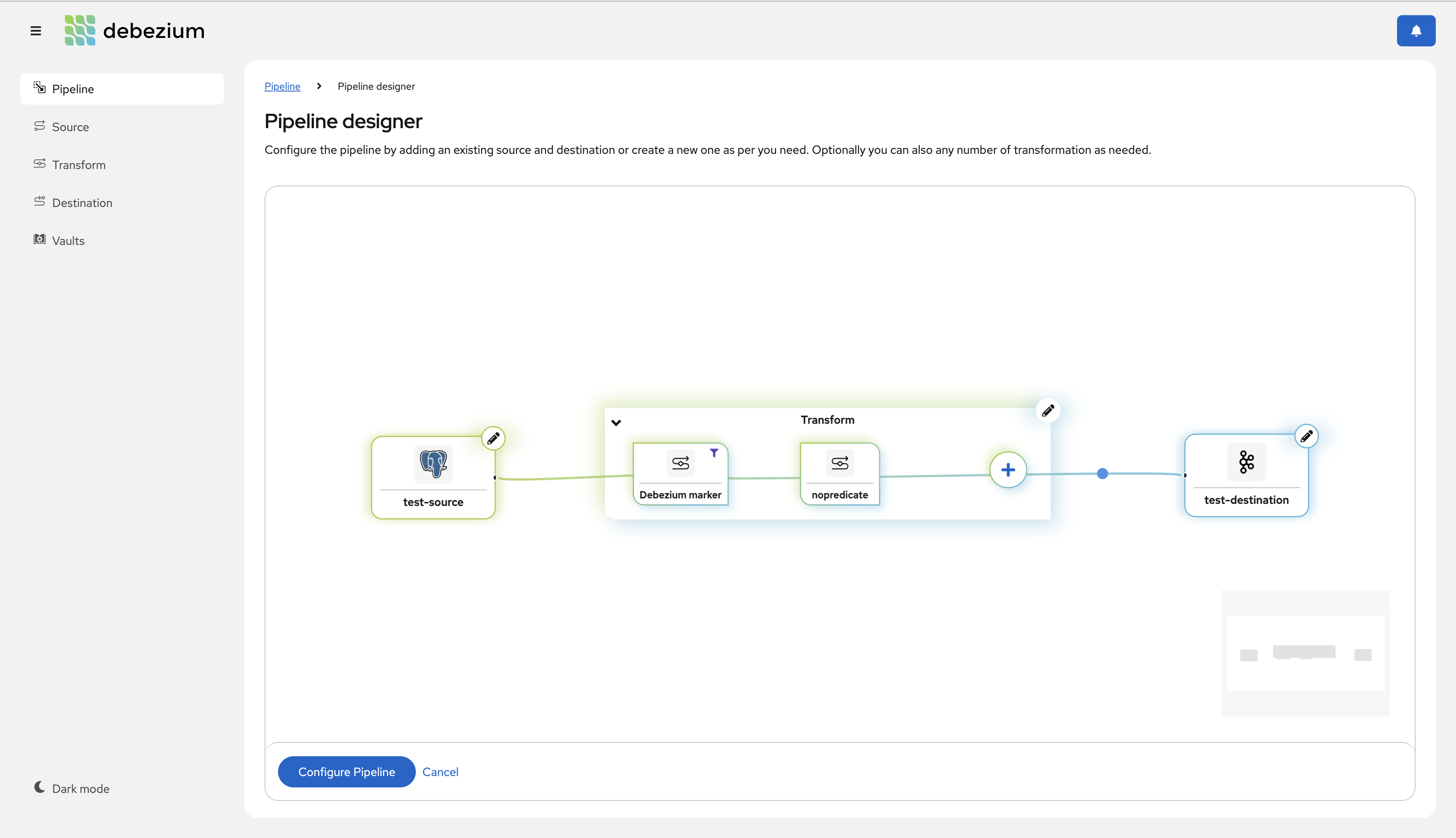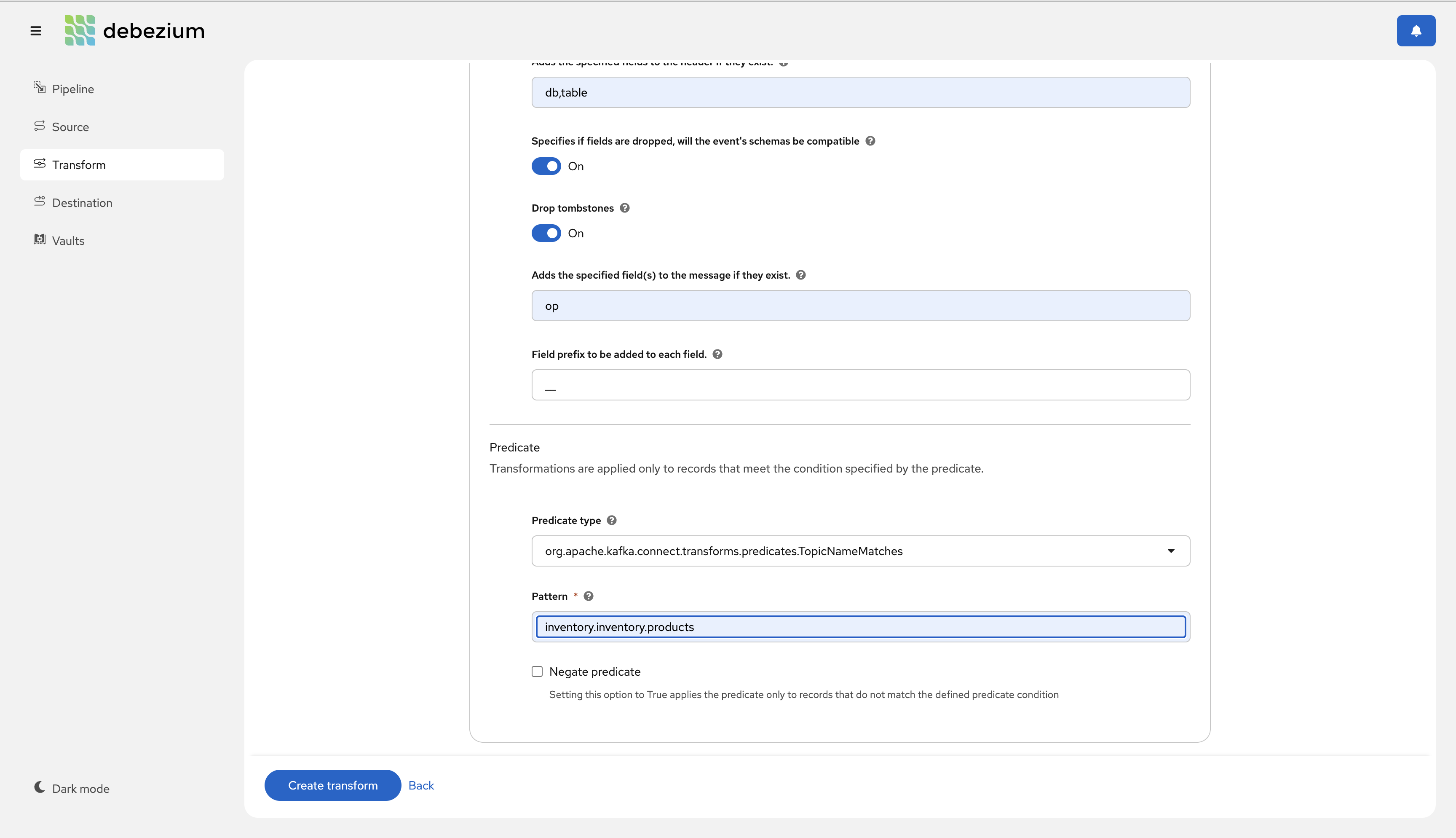
We’re pleased to announce the next pre-release of Debezium 3.1, 3.1.0.Alpha2. This release includes a number of breaking changes, new features, and improvements.
Breaking changes
With any new major release of software, there is often several breaking changes. The Debezium 3.1.0.Alpha2 release is no exception, so let’s discuss the major changes you should be aware about.
Changes to schema history configuration defaults
The documentation for schema.history.internal.store.only.captured.databases.ddl provided an incorrect default value. While this is not a code-specific breaking change, you should take a moment and reevaluate whether your deployment’s configuration depends on the different default value or not (DBZ-8558).
Potential Vitess data loss
The Debezium for Vitess connector had a rare but critical data loss bug that has existed since it was first introduced five years ago. If a primary key update is the last operation in a transaction, records may be lost. This bug affects all prior versions. It is highly recommended that users perform an immediate update to 3.1.Alpha2 or later to remedy this potential data loss (DBZ-8594).
Several Oracle LogMiner JMX metrics were removed
A number of Oracle LogMiner JMX metrics were deprecated in Debezium 2.6 and replaced with new metrics. The following are the JMX metrics that were removed:
| Removed JMX Metric | Note |
|---|---|
| Replaced by |
| Replaced by |
| Replaced by |
| Replaced by |
| Replaced by |
| Replaced by |
| Replaced by |
| Replaced by |
| Removed with no replacement. |
Please be sure to review your monitoring and observability infrastructure and adjust accordingly if you were still relying on any of the deprecated metrics (DBZ-8647).
Reselect column post processor behavior changed for Oracle
The ReselectColumnsPostProcessor behavior has changed and Oracle LOB columns will be reselected regardless of the lob.enabled configuration property’s value. This change enables users who may not want to mine LOB columns while streaming to still populate the LOB column using the column reselection process as an alternative (DBZ-8653).
New features and improvements
The upgrade to Debezium 3.1.0.Alpha2 introduces several new features and improvements in several components:
Error handling modes for Reselect column post processor
The ReselectColumnsPostProcessor is designed to supplement the streaming process, querying the current values for specific columns that require reselection based the connector configuration. This process is meant to be seamless and will use the streamed column data as a last resort if the query fails.
The following configuration property has been added:
reselect.error.handling.mode-
Specifies how to handle errors when the reselect query fails. By setting this to
warn, a warning will be logged when the reselect query fails, passing the streamed event data as-is. By setting this tofail, the connector will throw an exception when the reselect query fails.
The default for reselect.error.handling.mode is warn to retain old expected behavior (DBZ-8336).
TinyGo WASM data type improvements
Debezium’s scripting transformation solution provides the ability to write scripts using Go, and compile the TinyGo programs into WebAssembly. The ChicoryEngine runtime has been improved and now includes coverage to support accessing and working with Struct, Map, and Array Kafka schema types. In addition, accessors for more concrete types such as Int8, Int16, Int32, Int64, Float32, Float64, Bool, and Bytes are now included.
package main
import ( "gihub.com/debezium/debezium-smt-go-pdk" )
//export process
func process(proxyPtr uint32) uint32 {
var op = debezium.GetString(debezium.Get(proxyPtr, "value.op"))
var beforeId = debezium.GetInt8(debezium.Get(proxyPtr, "value.before.id")) // Uses new GetInt8
// value.op != 'd' || value.before.id != 2
return debezium.SetBool(op != "d" || beforeId != 2)
}
func main() {}Predicate support in Debezium Platform Transformation UI
The team has been hard at work improving the new and upcoming Debezium Management Platform, a modern management interface for Debezium deployments on Kubernetes.
In this release, we’re pleased to share that we’ve added support for defining predicates as part of the single message transformation interface. Below is a quick glimpse at this new interface (DBZ-8590).


Debezium Platform nightly container images available
We have begun publishing nightly images of the Debezium Management Platform, a modern management interface for Debezium deployments on Kubernetes (DBZ-8603).
quay.io/debezium/platform-conductor:nightly-
The backend service that provides administrative APIs to orchestrate and control Debezium deployments on Kubernetes. The image can be fetched using
docker pull quay.io/debezium/platform-conductor:nightly. quay.io/debezium/platform-stage:nightly-
The front-end that provides the user interface to interact with the conductor-based backend. The image can be fetched using
docker pull quay.io/debezium/platform-stage:nightly.
For more information, please see the README.md.
| While these containers are not intended for production, they’re a great way to explore the Debezium Management Platform. We’re really excited about this new component, and would love to hear your feedback. |
New Oracle LogMiner JMX metrics
A new JMX metric, MinedLogFileNames, has been added to the Debezium Oracle connector. This metric, as it’s name implies, returns a string array (String[]) of log file names that have been added to the current LogMiner session. This list represents all the log filenames are are currently being read by the connector (DBZ-8644).
| One of the first things we check when users report lag streaming changes is to see how many logs are part of the mining session. When an unusually large number of logs are added, this can create a bottleneck while Oracle LogMiner reads all these logs from disk. This metric provides visibility into the number of logs being mined without needing to adjust the connector’s logging levels. If you observe lag, one of the first things is to check how many logs are in this metric. A high volume of logs typically indicates potentially a high burst activity window on your database. |
Vitess treats string types with binary collation as strings
In an older change as part of DBZ-6748, a change was made to the Vitess connector to serialize varchar column types that had binary collation as Kafka string types. However, other character-driven data types like text, enum, and set were overlooked and these continued to be serialized as byte arrays.
In Debezium 3.1, we’ve aligned this behavior so that text, enum, and set types are always emitted as Kafka string types, even when the column uses binary collation (DBZ-8679).
| Be aware that if you use schema registry, the change in how |
Other changes
The following are some noteworthy changes in 3.1.0.Alpha2:
-
Align MySQL and MariaDB grammars with upstream versions DBZ-8270
-
Add transformations and predicates support in conductor DBZ-8459
-
Reduced record buffer doesn’t handle RECORD_VALUE with primary key fields DBZ-8593
-
Events for tables with generated columns fail when using hybrid mining strategy DBZ-8597
-
Change schema history producer configurations DBZ-8598
-
ANTLR DDL Parsing error DBZ-8600
-
Update Debezium Server and Operator to Quarkus 3.15.3 LTS DBZ-8601
-
MySQL master and replica images fail to start DBZ-8633
-
Remove misleading log entry about undo change failure DBZ-8645
-
Oracle metric OldestScnAgeInMilliseconds does not account for database timezone DBZ-8646
-
Using RECORD_VALUE with a DELETE event causes NullPointerException DBZ-8648
-
Downstream JDBC system tests fails DBZ-8651
-
Batch size calculation is incorrectly using min-batch-size DBZ-8652
-
Mysql example images for replication don’t work DBZ-8655
-
Oracle performance drop when transaction contains many constraint violations DBZ-8665
-
Upgrade protoc from 1.4 to 1.5 for postgres container images DBZ-8670
-
Upstream system tests fail DBZ-8678
-
Skip empty transactions with commit with redo thread equal to 0 DBZ-8681
-
DDL statement couldn’t be parsed: GRANT SENSITIVE_VARIABLES_OBSERVER DBZ-8685
-
SQL Server - Errors related to schema validation should provide more details DBZ-8692
-
Disable ARM images for PostgreSQL DBZ-8713
In total, 51 issues were resolved in Debezium 3.1.0.Alpha2. The list of changes can also be found in our release notes.
A big thank you to all the contributors from the community who worked diligently on this release: Alvar Viana Gomez, Andrea Peruffo, Anisha Mohanty, Chris Cranford, Gaurav Miglani, Henk van Dyk, Indra Shukla, Jiri Pechanec, Julien Roy, Katerina Galieva, Krzysztof Grzechnik, Mario Fiore Vitale, Naresh Gandi, Rajendra Dangwal, Robert Roldan, Rodolphe Quiedeville, Thomas Thornton, Vojtěch Juránek, and ismail simsek!
Chris Cranford
Chris is a software engineer at IBM and formerly Red Hat where he works on Debezium and deepens his expertise in all things Oracle and Change Data Capture on a daily basis. He previously worked on Hibernate, the leading open-source JPA persistence framework, and continues to contribute to Quarkus. Chris is based in North Carolina, United States.

About Debezium
Debezium is an open source distributed platform that turns your existing databases into event streams, so applications can see and respond almost instantly to each committed row-level change in the databases. Debezium is built on top of Kafka and provides Kafka Connect compatible connectors that monitor specific database management systems. Debezium records the history of data changes in Kafka logs, so your application can be stopped and restarted at any time and can easily consume all of the events it missed while it was not running, ensuring that all events are processed correctly and completely. Debezium is open source under the Apache License, Version 2.0.
Get involved
We hope you find Debezium interesting and useful, and want to give it a try. Follow us on Twitter @debezium, chat with us on Zulip, or join our mailing list to talk with the community. All of the code is open source on GitHub, so build the code locally and help us improve ours existing connectors and add even more connectors. If you find problems or have ideas how we can improve Debezium, please let us know or log an issue.